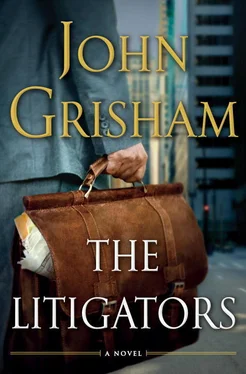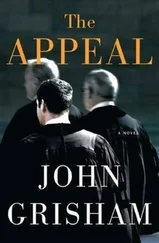“You’re toast.”
“Forget the divorce, baby, you’re too cute and you have great potential as a courtroom paralegal.”
Helen grew serious and said, “Look, I realize you have a lot on your mind right now, but you must be thinking about the future. You can’t stay at Finley & Figg. What if Oscar can’t come back? What if Wally can’t kick the booze? And assuming they can, why would you want to stay there?”
“I don’t know. I haven’t had much time to think about it.” He had shielded her from the twin nightmares of the Rule 11 sanctions and the potential malpractice cases, and he had decided not to tell her about the $200,000 line of credit he had guaranteed along with the two partners. Leaving the firm in the near future was not likely.
“Let’s talk about it later,” he said.
“I’m sorry. It’s just that I think you can do so much better, that’s all.”
“Thank you, dear. What — you’re not impressed with my courtroom skills?”
“You’re brilliant, but I suspect one big trial might be enough for you.”
“By the way, Nadine Karros doesn’t do divorces.”
“Then that settles it. I guess I’ll just tough it out.”
At 1:30, Borzov tottered to the witness stand for the last time, and Nadine began her final assault. Since he was a cardiologist who didn’t treat patients, it was safe to assume he never treated Percy Klopeck. True, plus Mr. Klopeck had been dead a long time before Borzov was hired as an expert. But surely he had consulted the doctors who did treat him. No, Borzov admitted, he had not. Feigning disbelief, she began hammering away at this incredible oversight. His responses grew slower, his voice weaker, his Russian thicker, until finally, at 2:45, Borzov pulled a white handkerchief from a coat pocket and began waving it.
Such drama was not contemplated by the wise folks who wrote the rules of federal trial procedure, and David was uncertain about what he should do. He stood and said, “Your Honor, I think this witness has had enough.”
“Dr. Borzov, are you okay?” Judge Seawright asked. The answer was obvious.
The witness shook his head no.
“Nothing further, Your Honor,” Ms. Karros announced and left the podium, another impressive annihilation under her belt.
“Any redirect, Mr. Zinc?” the Judge asked.
The last thing David wanted to do was to try to revive a dead witness. “No sir,” he said quickly.
“Dr. Borzov, you’re excused.”
He staggered away with the aid of a bailiff, $75,000 richer but with another black mark on his résumé. Judge Seawright recessed court until 3:30.
Dr. Herbert Threadgill was a pharmacologist of dubious reputation. He, like Borzov, was spending the waning days of his career living the easy life, away from the rigors of real medicine, doing nothing but testifying for lawyers who needed his notoriously pliant opinions to fit their version of the facts. The paths of both professional testifiers crossed occasionally, and they knew each other well. Threadgill had been reluctant to sign on for the Klopeck case for three reasons: the facts were lousy; the case was weak; and he had no desire to face Nadine Karros in a courtroom. He had finally said yes for only one reason—$50,000 plus expenses, for only a few hours of work.
During the recess, he saw Dr. Borzov outside the courtroom and was appalled at his appearance. “Don’t do it,” Borzov said as he shuffled toward the elevators. Threadgill hurried to the men’s room, splashed some water in his face, and decided to flee. Screw the case. Screw the lawyers, they were not major players anyway. He had been paid in full, and if they threatened to sue, he might consider returning a portion of his fee, or not. He would be on an airplane in an hour. In three hours he would be having a drink with his wife on the patio. He wasn’t committing a crime. He was under no subpoena. If necessary, he would never return to Chicago.
At 4:00 p.m., David returned to the judge’s chambers and said, “Well, Judge, looks like we’ve lost another one. I can’t find Dr. Threadgill, and he won’t answer his phone.”
“When did you last speak to him?”
“During lunch. He was all set, or at least he said so.”
“Do you have another witness, one who is here and has not gotten lost?”
“Yes sir, my economist, Dr. Kanya Meade.”
“Then put her on, and we’ll see if the lost sheep somehow find their way home.”
Percy Klopeck worked for twenty-two years as a dispatcher for a freight company. It was a sedentary job, and Percy did nothing to break the monotony of sitting in a chair for eight straight hours. Non-union, he was earning $44,000 a year when he died and could have reasonably expected to work for seventeen more years.
Dr. Kanya Meade was a young economist at the University of Chicago, and she moonlighted occasionally as a consultant to pick up a few bucks—$15,000 in the Klopeck case. The math was straightforward: $44,000 a year for seventeen years, plus anticipated annual increases based on the historical trend, plus a retirement based on a fifteen-year life expectancy beyond the age of sixty-five, at 70 percent of his highest salary. In summary, Dr. Meade testified that Percy’s death had cost his family $1.51 million.
Since he had died peacefully in his sleep, there would be no claim for pain and suffering.
On cross-examination, Ms. Karros took exception to the numbers of Percy’s life expectancy. Since he had died at forty-eight, and early deaths were common among his male blood relatives, it was unrealistic to suggest that he would have lived to age eighty. Nadine was careful, though, not to spend much time debating damages. To do so would lend credence to the numbers. The Klopecks were not due a penny, and she would not give the impression she was worried about the alleged damages.
When Dr. Meade finished at 5:20, Judge Seawright adjourned court until nine the following morning.
After a hard day in court, Helen was in no mood to cook. She picked up Emma at her sister’s home in Evanston, thanked her sister profusely and promised to debrief later, and raced away to the nearest fast-food restaurant. Emma, who slept in moving vehicles much better than in her own crib, dozed peacefully as Helen inched along in the drive-thru. She ordered more burgers and fries than usual because she and David were both hungry. It was raining, and the late-October days were growing shorter.
Helen drove to the Khaings’ apartment near Rogers Park, and by the time she arrived, David was there. The plan was to have a quick dinner and hustle home for an early bedtime — Emma, of course, holding the key to that. David had no more witnesses to present for the plaintiff, and he was not sure what to expect from Nadine Karros. In the pretrial order, the defense had listed twenty-seven expert witnesses, and David had read every one of their reports. Only Nadine Karros knew how many to call to the stand, and in what order. There was little for David to do but sit, listen, object occasionally, pass notes to his comely paralegal, and try to give the impression he knew what was going on. According to a friend from law school, a litigator in a Washington firm, there was an excellent chance the defense would move for summary judgment, convince Seawright that the plaintiff had failed to provide even the bare bones of a proper case, and win outright without presenting a single witness. “It could be over tomorrow,” he said as he sat in traffic in Washington and David did the same in Chicago.
Since Thuya had been released from the hospital five months earlier, the Zincs had missed only a few of their Wednesday night fast-food dinners. The arrival of Emma had briefly interrupted things, but before long they were packing her along for the visits. A ritual had clearly been established. As Helen approached the apartment building with the baby, Lwin and Zaw, mother and grandmother, bolted from the door and raced to see the baby. Inside, Lynn and Erin, Thuya’s two older sisters, sat side by side on the sofa, waiting eagerly to get their hands on Emma. Helen would place her gently in one of the laps, and the girls and their mother and grandmother would chatter and squeal and act as if they had never before seen an infant. They gently passed her around, back and forth with great care. This would go on for a long time while the men were starving.
Читать дальше












